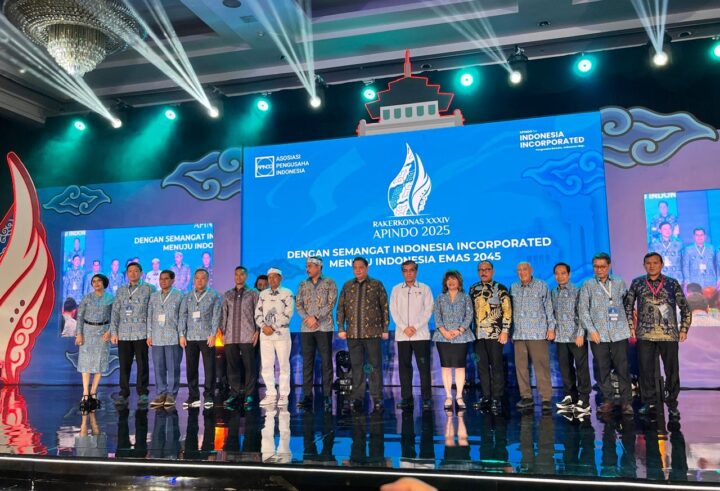
Bandung - Chairman of the Indonesian Chamber of Commerce and Industry (Kadin) Anindya Novyan Bakrie emphasized the importance of productive development and the central role of the private sector in driving the national economy.
Anindya often referred to as Anin made these remarks during the 34th National Work and Consultation Meeting (Rakerkonas) of the Indonesian Employers Association (Apindo), held at eL Royale Hotel in Bandung, West Java, on Tuesday (August 5, 2025).
“I see that productive development is critically needed in Indonesia today. Kadin warmly welcomes Apindo’s efforts. Kadin was founded under Law No. 1 of 1987, supported by two pillars: regional Kadin bodies and associations. In this structure, Apindo stands at the forefront of associations under Kadin,” Anin explained.
He underlined the irreplaceable contribution of the private sector and MSMEs (Micro, Small, and Medium Enterprises), which account for 60% of Indonesia’s GDP, 80% of Gross Capital Formation, and 90% of total national employment.
“A significant portion of state revenue also comes from this sector. So it’s only natural that we support the government because when the government succeeds, we all succeed,” Anin added.
Amid global economic slowdown and Indonesia’s 4.87% GDP growth in the first quarter, Anin welcomed the government’s focus on efficiency measures as a foundation for long-term economic resilience.
Yet, he also shared promising updates from the business world. According to the Financial Services Authority (OJK), the net profit of around 800 publicly listed companies rose 21.2%, and credit growth hit 7.7% in the first half of 2025.
“This may not yet be widely felt, but it’s a sign of growing optimism. We need to continue proposing new ideas and support the stimulus initiatives already underway,” he said.
Anin also stressed the importance of regional economic contributions in boosting national growth. He voiced strong support for President Prabowo Subianto’s strategic programs, particularly those based on the paradigm of “teaching people to fish, not just giving them fish.”
Programs such as the Free Nutritious Meals (MBG) initiative and the Merah Putih Village Cooperatives are examples of long-term investments in the nation's future, even if their implementation is complex.
“Establishing 30,000 MBG kitchens (Nutrition Fulfillment Service Units) and 80,000 cooperatives is no small feat. But these are long-term investments in our next generation,” he emphasized.
Anin called on all stakeholders, including Apindo and regional Kadin chapters, to actively support these efforts through synergy and collaboration.
In the industrial sector, Anin welcomed the government’s emphasis on agriculture and manufacturing as key engines of growth. He urged that downstream industrialization (hilirisasi) should extend beyond just the mineral sector.
“We need to ensure that downstream development is not limited to sectors like nickel or critical minerals but expanded across all industries,” Anin said.
In terms of international trade, Anin highlighted the untapped potential for export growth to the United States and European Union. He noted that while Indonesia already enjoys a trade surplus, there is room to double trade volume with the U.S. from $40 billion to $80 billion.
“If we can raise exports to the U.S. from $28 billion to $40 billion, that’s already an achievement. But we should also look at the EU, whose import volume is even larger than the U.S.,” he noted.
He also pointed to the ratification of the EU-Indonesia Comprehensive Economic Partnership Agreement (EU-CEPA) as a strategic opportunity to expand exports including for palm oil, a commodity that has long faced resistance in Europe.
“One breakthrough innovation is the opportunity to export palm oil to the EU something that has faced significant barriers in the past,” Anin stated.
Anin closed by underscoring the importance of gotong royong (mutual cooperation) among businesses, associations, and regional governments under the Indonesia Incorporated framework toward 2045.
“This is a unique opportunity for Kadin and Apindo to work hand in hand with the government offering input to ensure that regulations are conducive and globally competitive. I see that under this administration, the private sector is being given greater opportunities,” Anin added.
“We (Kadin) will hold a retreat in Magelang not to become soldiers, but to deepen our sense of national identity. Entrepreneurs too must have patriotism and nationalism,” he concluded.
West Java Industrial Zone a Growth Engine But Labor Welfare Remains a Challenge
In the same event, Coordinating Minister for Economic Affairs Airlangga Hartarto highlighted the strategic role of West Java’s industrial sector in supporting national economic growth.
Airlangga noted that industrial development is expanding to Subang, boosted by infrastructure such as Patimban Port, giving new life to the region’s economic prospects.
Despite a temporary decline in the Manufacturing Purchasing Managers’ Index (PMI), he remains optimistic about the sector’s rebound.
“Labor requirements in the manufacturing sector differ from those in garments both in terms of skill levels and specialization. This will be a key challenge moving forward,” he explained.
Meanwhile, West Java Governor Dedi Mulyadi proudly stated that the province currently ranks first in national investment, with a total of IDR 72.5 trillion. However, he admitted much work remains.
“Even though West Java tops the investment charts, I’m not satisfied. There are fiscal, social, and political issues that must be addressed. That’s why a governor must be able to orchestrate investment interests from the neighborhood level to the national ministries,” he said.
Apindo Chairwoman Shinta Widjaja Kamdani concluded the session by urging businesses to embrace a collective spirit in facing economic challenges, stressing the importance of concrete follow-up after Rakerkonas.
“What matters most from this meeting isn’t just policy recommendations, but walking away with a spirit of struggle just like the Bandung Sea of Fire. That’s why we chose Bandung as the host city,” Shinta remarked.
National Economy
Regional Economy
National Economy
Regional Economy